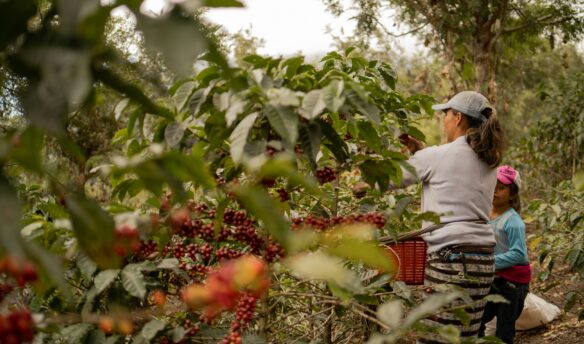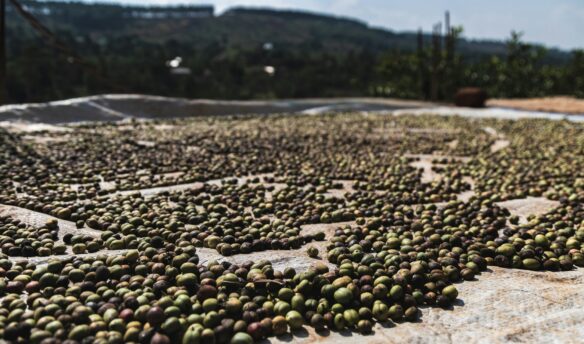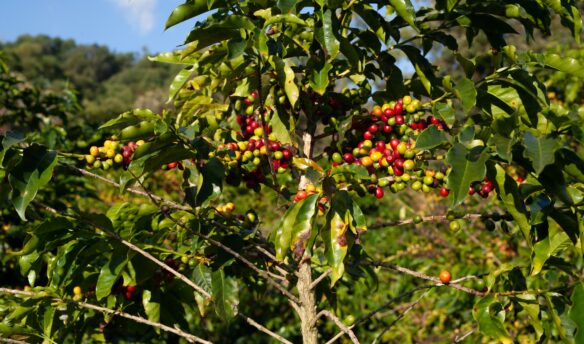Workers at Starbucks and Ultimo Coffee make progress in their fight for a fair contract. Plus, Indonesian coffee farmers struggle with erratic weather patterns, and scientists find more evidence of coffee’s superpowers.
‘Starbucks and Union Agree to Work Out Framework for Contract Talks’ – via New York Times
On February 27th, union organizers and Starbucks announced a breakthrough in contract negotiations. Nearly 26 months after the first Starbucks unionized in Buffalo, New York, Starbucks Workers United says both parties will “begin discussions on a foundational framework to achieve collective bargaining agreements for represented stores and partners.”
The “foundational framework” will set a “fair process for organizing,” Starbucks said in a statement, and resolve some ongoing brand and IP litigation. The statement also reiterated the company’s goal to ratify union contracts by the end of the year and offered an olive branch of sorts to unionized workers: “As a sign of good faith, Starbucks has agreed to provide partners represented by Workers United with the May 2022 benefits, including credit card tipping.” Previously, Starbucks had extended these benefits only to workers at non-unionized stores.
What a “fair process for organizing” means is still unclear, but Jenny Brown of Labor Notes writes, “the phrase usually means that management will recognize the union if a majority of workers in a store sign a petition, rather than forcing workers into a bruising election period where managers threaten and cajole workers into rescinding their support.” However, Brown notes that it could mean Starbucks will merely ease off on its anti-union campaign.
“While there is plenty of work ahead, coming together to develop this framework is a significant step forward and a clear demonstration of a shared commitment to working collaboratively and with mutual respect,” Starbucks Workers United said in their statement.
2023 proved challenging for the union: After nearly hundreds of stores filed to unionize in 2022 following the initial victory in Buffalo, new filings slowed in 2023. Starbucks also aggressively fought against the union, violating labor law in the process. The National Labor Relations Board has lodged nearly 500 charges against the company for alleged union-busting, charges Starbucks denies. Because of this, labor experts are treating the news with caution.
“If Starbucks genuinely intends to respect workers’ right to organize, stop its intimidation and harassment of pro-union workers, and engage in real good-faith bargaining, this is a huge step forward,” John Logan, professor and chair of Labor and Employment Studies at San Francisco State University, told the New York Times. However, “there’s plenty of reason to be cautious: Over the past 2.5 years, the company has engaged in one of the most aggressive and unlawful anti-union campaigns in modern history.”
‘Harsh Dry Season Sours Harvest Prospects for Java Coffee Farmers’ – via Mongabay
Indonesia is the world’s fourth-largest coffee producer, exporting over 10 million bags each year—about 5% of the global total. However, heavy rainfall followed by an extended drought has impacted coffee production in the archipelago and could cause harvests to plummet by as much as 20% over the previous year.
Coffee farmers in Jember on the east of Indonesia’s Java Island blame the El Niño weather pattern for the heat and lack of rain, a wild swing from the previous two years when La Niña caused excessive rainfall. Heavy rain during the flowering stage of coffee growing can cause flowers and leaves to drop, impacting coffee trees’ ability to form fruit and thus reducing yield. However, insufficient rain can impair bean development and eventually kill the plant.
“The flowers are dry and a lot of the leaves have wilted,” Saturi, a Jember coffee farmer who expects a 50 percent drop in this year’s harvest, told Mongabay. “And the trees are dying because of this dry weather.”
Meteorology, Climatology, and Geophysical Agency, Indonesia’s national meteorology agency, predicts that El Niño’s effects will continue into 2024. All this uncertainty is making coffee producers uneasy.
“When the coffee has gone bad, it’s hard to recover,” Saturi said. “You have to replant.”
More News
‘Colombia’s FNC Launches Direct Trade Export Platform Cafix‘ – via Daily Coffee News
‘Nearly 170,000 Bags of Arabica Coffee Awaits Grading at ICE Exchange‘ – via Nasdaq
‘The Dream Of Owning A Coffee Shop Is As Alluring As Ever‘ – via Sprudge
‘In China’s Battle of the Lattes, Luckin Coffee Keeps Beating Starbucks’ – via CNN
‘Enzyme Solution Targets Reduction of Acrylamide in Coffee Products’ – via FoodBev Media
‘Value Chain Study Explores How to Make Coffee Work for Smallholder Farmers’ – via Daily Coffee News
‘Memphis-based Coffee Business Cxffeeblack Launches Public Investment Campaign‘ – via Memphis Business Journal
‘Costa Rica Coffee Farmers Forced to Innovate as Rainfall Plummets‘ – via Tico Times
The Week in Coffee Unionizing
While Starbucks Workers United celebrated a breakthrough in contract negotiations, unionized Ultimo Coffee employees also picked up a win in Philadelphia.
After more than a year of fractious negotiations, NLRB complaints, a boycott, and a one-day strike earlier this week, workers at Ultimo’s Newbold and Rittenhouse locations announced that they had reached a tentative agreement on a contract with owners Aaron and Elizabeth Ultimo.
“We’re glad to have been able to work with [the Ultimos] to reach something that both parties are happy with and that will benefit all of us,” barista and lead negotiator Kate Lord told the Philadelphia Inquirer. “We’re also very excited to be open and back to normal business tomorrow! We’re looking forward to seeing all of our regulars and thrilled to know that they can be assured that they are patronizing a business that supports their workers.”
The contract stipulations include a $14 per hour base rate for new hires, raises for all current staff, increased paid time off, the elimination of at-will employment, and the creation of a Labor Management Committee. Local 80, the coffee-shop-specific union that has been trying to organize Philadelphia’s cafes and roasteries, called the tentative agreement “incredible,” noting that “after a very tough, long contract battle, workers are thrilled that the Ultimos are clearly ready to build a strong relationship with their workers.”
“We are pleased to announce we have reached an agreement with our employees on a first contract (though we believe a strike was wholly unnecessary in order to reach this point today),” the Ultimos told the Philadelphia Inquirer. “We look forward to continuing to work with them and the Union.”
The Week in Corporate Coffeewashing
German coffee giant Tchibo has partnered with the sustainability auditor Enveritas to source 100 percent of its coffee “responsibly” by 2027.
Tchibo, a Hamburg-based coffee roaster, made $3.25 billion in 2021 and buys its coffee from 75,000 farmers in Guatemala, Honduras, Vietnam, and Brazil. However, just 20% is currently certified as either Fairtrade, Rainforest Alliance, or USDA Organic. While certifications aren’t everything—many small farms grow coffee sustainably but cannot afford the costs of certification—the low percentage of farms they source from with any sort of certification shows just how big a challenge Tchibo has on its hands.
It isn’t entirely clear what Tchibo means by the word “responsibly.” World Coffee Portal says that Enveritas will conduct a supply chain audit “to measure progress on environmental, economic and social KPIs and develop sustainability programmes tailored to individual coffee producing countries … the new initiative will enable it to reach farmers’ beyond certified premium coffees’ on initiatives including agroforestry, reforestation and planting new coffee climate resilient coffee varieties.”
Upon entering the US market in 2020, Tchibo heavily touted its sustainability credentials. “The company believes in fair business practices along the coffee value chain,” a press release states. “As a family-owned business, Tchibo has been personally and culturally committed to sustainability and fairness for decades. Tchibo is one of the leading drivers in sustainable coffee initiatives and fairness standards, and committed to protecting the future of coffee, the environment, biodiversity, water resources, and workers safety and rights.”
If it has been committed to sustainability and fairness for decades, why does Tchibo now need an external organization to certify its practices as such? And if it will only be 100 percent responsibly sourced by 2027, what has it been doing for the past four years? Just asking questions.
Is Coffee Good For You?
What to do with coffee pulp? Some possibilities for repurposing this waste product include making coffee flour and cascara tea. But now, coffee pulp might heal your wounds.
Researchers in Brazil looked at the fruit of the coffee cherry, which is removed during processing and often discarded, as a potential replacement for chemical-based substances in pharmaceutical and cosmetic products.
More than ever, consumers are interested in chemical-free products. Although they’ve been around for thousands of years, phytocosmetics—cosmetic products which rely on plant extracts for their active ingredients—have increased in popularity in recent years. The researchers aimed to “develop a phytocosmetic only with natural products containing coffee pulp extract as active pharmaceutical ingredient with antioxidant, antimicrobial and healing activity.”
Researchers conducted a study, published in Scientific Reports, which found that pulp, particularly from robusta coffee, contained high levels of antioxidants like chlorogenic acid and exhibited antibacterial activity. The most promising sample “was incorporated into a phytocosmetic that was stable at room temperature for a period of 90 days, promoted cell migration, consequently improved the healing process.”
Sprudge notes that, due to the amount of pulp produced each year, its use in pharmaceutical or cosmetic products could also bring additional income to farmers.















